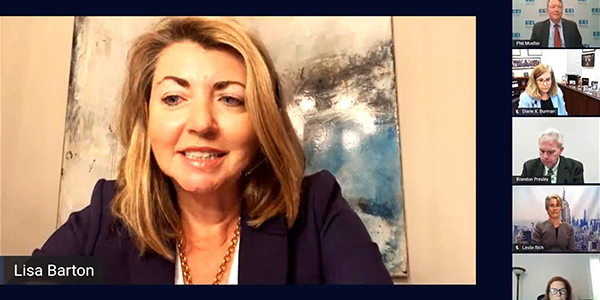Experts this week said 2020’s impacts on the energy sector will be lasting, predicting a gradual economic recovery but swifter and permanent social transformation.
Utilities’ financial outlooks are steady but fragile as 2020 wanes, panelists said during the final two sessions of Edison Electric Institute’s 55th Financial Conference on Wednesday.
“What’s the saying? May you live in interesting times,” joked Brandon Presley, outgoing president of National Association of Regulatory Utility Commissioners and a member of the Mississippi Public Service Commission. He added that he never thought he would conduct NARUC business from a Mississippi conference room for an entire year.
American Electric Power Executive Vice President Lisa Barton said that in March, her company was already agility testing for telework opportunities when social distancing mandates wiped out office commutes.
“And we haven’t been back to the office since,” she said.
Leslie Rich, managing director of J.P. Morgan Asset Management, said electric utilities were quick to cut costs after a steep decline in demand in March and April.
She said the question remains on how long lowered demand will persist into 2021 and how regulators will consider that when utilities’ rate cases come before them.
“Revenues are down, sales are down and [operations and maintenance] are down,” Rich said.
Fitch Ratings Senior Director Barbara Chapman agreed that the recession will need to be factored into upcoming rate cases. She said Fitch initially forecasted a quadrupling of bad debt among electric utilities that fortunately did not come to pass. She also said Fitch under-forecasted residential energy demand in the pandemic’s early phases.
“But certainly there’s things on the horizon to give us concern,” Chapman said.
Rich warned that winter will bring the heftiest utility bills, as home and business heating ramps up.
“You don’t want to see customers get buried by their arrearages,” she said, but she added that utilities have been “creative” so far in keeping a steady cash flow.
NARUC remains opposed to a national moratorium on utility shutoffs for the remainder of the pandemic, Presley said.
“State regulators did not have to be prodded by anyone. … Nobody rang our phones and said, ‘You have to step up.’ We did it out of our own volition,” Presley said. “State regulators are on the ground and listening to health and human service departments and wisely making decisions in their respective jurisdictions.”
He also warned that “what works in New York may not work in North Carolina, and what works in North Carolina may not work in North Dakota.”
“The worst thing we could have happened is a fast and loose national policy that wasn’t tailored to constituents. Utilities have to have a heart, not just a head, and regulators have shown that. … But bills do have to get paid.”
Barton said when AEP has lifted shutoff moratoriums, it has been “pleasantly surprised” by customers’ willingness to enroll in payment plans. “It’s often people that have never been in this kind of situation before.”
Chapman said utilities generally want to avoid any “PR nightmares” and the perception of callousness as they resume disconnections.
New York Public Service Commissioner Diane Burman agreed with Presley about a national moratorium, but she warned that customers are incurring balances that they might not be able to pay off.
“We have to realize that there is growing debt on customers not being able to pay these bills,” she said. Regulators and utilities should enact measures such as deferred payment plans and investigate the fallout from shuttered businesses that will never cover their final bills. Their arrears should not be absorbed by other ratepayers, she said.
She also said she has noticed stronger corporate commitment to decarbonization and clean energy, even if the pandemic interrupted steady revenues and some technological breakthroughs. She noted the docket her commission opened in October to consider collecting financial disclosures on climate change-related risks.
Barton said going forward, the grid must be “reinforced” so it can support an onslaught of electrification and make it possible for old generation assets to continue to retire and be replaced by renewable sources.
Rich said more utilities have spun off fossil fuel businesses to become pure-play utilities, both for the revenue and the improved public reception.
Social and Environmental Justice
Racial equity and sustainability had a watershed year, despite the coronavirus, panelists agreed. The pandemic and the police killing of George Floyd amplified a social justice focus for virtually all businesses, the energy sector included.
Fortis CFO Jocelyn Perry said social justice is a relatively new investor expectation. Before this year, Perry said Fortis had focused on gender equality, with a goal of women making up 40% of its board and 33% of its executives.
“But you throw a pandemic and social unrest in this, and we have to broaden more quickly than we thought we had to. … Our customers and our communities are hurting,” she said.
ISS Corporate Solutions Vice President Ben Magarik said an emerging trend is investors voting against or withholding votes on prospective board members. He also said there is increasing pressure on businesses to make disclosures “on a basic level of ethnic or racial diversity” in their workforces.
“There’s an enormous amount of uncertainty in the next few weeks, but there’s also a palpable sense of change among investors and businesses,” Magarik said. “I think society’s pretty clear that we’ve got some hard challenges to tackle.”
Consolidated Edison Director of Investor Relations Jan Childress said his company is tracking metrics on diversity and progress on climate change and tying them to executive compensation. He said coupling climate and cultural progress to salaries is necessary for change and “simply opening our eyes to the truth.”
Data tracking on diversity and sustainability has emerged throughout 2020 for electric utilities, Magarik said.
“I risk a cliché, but what gets measured gets managed,” he said.







